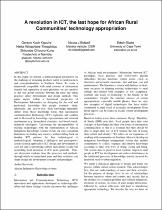 ResearchSpace
ResearchSpace
Revolution in ICT, the last hope for African rural communities' technology appropriation
JavaScript is disabled for your browser. Some features of this site may not work without it.
- ResearchSpace
- →
- Research Publications/Outputs
- →
- Conference Publications
- →
- View Item
| dc.contributor.author |
Kapuire, GK

|
|
| dc.contributor.author |
Winschiers-Theophilus, H

|
|
| dc.contributor.author |
Chivuno-Kurio, S

|
|
| dc.contributor.author |
Bidwell, NJ

|
|
| dc.contributor.author |
Blake, E

|
|
| dc.date.accessioned | 2010-12-02T15:06:17Z | |
| dc.date.available | 2010-12-02T15:06:17Z | |
| dc.date.issued | 2010-11 | |
| dc.identifier.citation | Kapuire, GK, Winschiers-Theophilus, H, Chivuno-Kurio, S et al. 2010. Revolution in ICT, the last hope for African rural communities' technology appropriation. Proceedings of 4th International Development Informatics Association (IDIA) Conference 2010 Exploring Success and Failure in Development Informatics: Innovation, Research and Practice, Cape Town, South Africa, 3-5 November 2010, pp 8 | en |
| dc.identifier.isbn | 978-0-620-47590-7 | |
| dc.identifier.uri | http://hdl.handle.net/10204/4587 | |
| dc.description | Proceedings of 4th International Development Informatics Association (IDIA) Conference 2010 Exploring Success and Failure in Development Informatics: Innovation, Research and Practice, Cape Town, South Africa, 3-5 November 2010, pp 8 | en |
| dc.description.abstract | In this paper the authors present a methodological perspective on the challenge of designing products suited to rural practices and conceptualizations in Southern Africa. To create a framework compatible with rural customs of information transfer and supportive of rural priorities, they are sensitive to the way power relations between the rural and urban practises affect development and design methods. This paper argues within a theoretical perspective of Development Informatics on designing for the oral and performed knowledge that people routinely share, informally, and face to face. Such knowledge inherently differs from those knowledge forms that Information communication Technology (ICT) explicates and codifies and is illserved by knowledge representation and retrieval mechanisms (e.g. hierarchical structures, textbased search, technical ontologies). Uncovering the incompatibility of existing technologies with the representation of African Indigenous Knowledge systems reveals their own conceptual limitations in finding new answers without falling back on familiar ICT patterns, be they technological or methodological. Adopting a dialogical and participatory action research approach to ICT design and development is core not only to preserving culture and identity locally but nourishing local invention of ICT more generally. Thus, their discussion explores how the processes and methods, through which they understand users and their activities, can shape design and development concepts and paradigms. | en |
| dc.language.iso | en | en |
| dc.relation.ispartofseries | Conference Paper | en |
| dc.subject | Rural information transfer | en |
| dc.subject | Rural information challenges | en |
| dc.subject | African rural communities | en |
| dc.title | Revolution in ICT, the last hope for African rural communities' technology appropriation | en |
| dc.type | Conference Presentation | en |
| dc.identifier.apacitation | Kapuire, G., Winschiers-Theophilus, H., Chivuno-Kurio, S., Bidwell, N., & Blake, E. (2010). Revolution in ICT, the last hope for African rural communities' technology appropriation. http://hdl.handle.net/10204/4587 | en_ZA |
| dc.identifier.chicagocitation | Kapuire, GK, H Winschiers-Theophilus, S Chivuno-Kurio, NJ Bidwell, and E Blake. "Revolution in ICT, the last hope for African rural communities' technology appropriation." (2010): http://hdl.handle.net/10204/4587 | en_ZA |
| dc.identifier.vancouvercitation | Kapuire G, Winschiers-Theophilus H, Chivuno-Kurio S, Bidwell N, Blake E, Revolution in ICT, the last hope for African rural communities' technology appropriation; 2010. http://hdl.handle.net/10204/4587 . | en_ZA |
| dc.identifier.ris | TY - Conference Presentation AU - Kapuire, GK AU - Winschiers-Theophilus, H AU - Chivuno-Kurio, S AU - Bidwell, NJ AU - Blake, E AB - In this paper the authors present a methodological perspective on the challenge of designing products suited to rural practices and conceptualizations in Southern Africa. To create a framework compatible with rural customs of information transfer and supportive of rural priorities, they are sensitive to the way power relations between the rural and urban practises affect development and design methods. This paper argues within a theoretical perspective of Development Informatics on designing for the oral and performed knowledge that people routinely share, informally, and face to face. Such knowledge inherently differs from those knowledge forms that Information communication Technology (ICT) explicates and codifies and is illserved by knowledge representation and retrieval mechanisms (e.g. hierarchical structures, textbased search, technical ontologies). Uncovering the incompatibility of existing technologies with the representation of African Indigenous Knowledge systems reveals their own conceptual limitations in finding new answers without falling back on familiar ICT patterns, be they technological or methodological. Adopting a dialogical and participatory action research approach to ICT design and development is core not only to preserving culture and identity locally but nourishing local invention of ICT more generally. Thus, their discussion explores how the processes and methods, through which they understand users and their activities, can shape design and development concepts and paradigms. DA - 2010-11 DB - ResearchSpace DP - CSIR KW - Rural information transfer KW - Rural information challenges KW - African rural communities LK - https://researchspace.csir.co.za PY - 2010 SM - 978-0-620-47590-7 T1 - Revolution in ICT, the last hope for African rural communities' technology appropriation TI - Revolution in ICT, the last hope for African rural communities' technology appropriation UR - http://hdl.handle.net/10204/4587 ER - | en_ZA |





